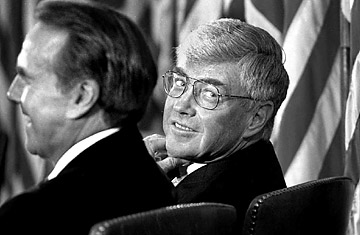
Republican vice presidential nominee Jack Kemp waits to be introduced with presidential candidate Bob Dole durring the 1996 campaign.
The breakfast crowd at Sylvia's usually comes for grits and country sausage. But on September 6, 1996, something special was on the menu of the landmark Harlem eatery: A white, middle-aged man running for vice president on the Republican ticket was stumping for votes. "This is the color of the new civil-rights revolution — green," shouted Jack Kemp, waving a dollar bill and wearing a sweat-drenched white shirt, as he stood on top of a folding chair.
Kemp might as well have been selling raincoats in the Sahara. He and Bob Dole, his presidential running mate, had no chance of breaking through in Harlem, the solidly Democratic capital of black America. GOP strategists had figured a visit there might demonstrate the kind of tolerance and inclusion necessary to nail down moderate swing votes in white suburbs. But while that was the reason everyone else gave for the unusual stop at Sylvia's soul food café, it was not the reason for Kemp, who believed wholeheartedly that Republicans could and had to win over blacks. "For Jack, it wasn't a political tactic," recalled his campaign manager, Wayne Berman, who accompanied Kemp that fall to inner-city communities from South Central Los Angeles to the South Side of Chicago. "It was real. He'd say, 'We're going to change minds.'" (Read the TIME Cover Story: "Dole, Kemp and the G.O.P.")
Those words serve as a lasting political testament of Kemp, who died Saturday and is being memorialized at the National Cathedral Friday. Thirteen years later, a black Democrat occupies the White House and Kemp's party is fighting off political isolation, popular only among a small fraction of voters who are mainly white, conservative or Christian.
But, to say that Kemp sought to build bridges across racial lines solely for political gain, would ignore much of his 73 years. After growing up in largely white LA of the 1940s, he confronted racial prejudice as a young professional quarterback playing games occasionally in the Jim Crow South. When his (then) Los Angeles Chargers traveled to Houston for a 1960 game, the team had to stay at University of Houston dorms because no hotels would accept black players. Kemp joined other teammates in bolting a movie theater that restricted black members to the balcony. Four years later, Kemp arrived in New Orleans as team captain for the 1964 American Football League All-Star game. After watching black players turned away from nightclubs and "white" taxis, he supported a boycott of the city. The game was moved to Houston, which had progressed farther along the path of desegregation.
In 1971, Kemp began a career in politics, describing himself as a "bleeding-heart conservative." As a GOP congressman from Buffalo, the blue-collar city whose AFL team he had led to two championships in the mid '60s, he worked with black colleagues on issues opposed by both many conservatives and Republicans, including sanctions on South Africa and a national holiday to commemorate the birthday of the Rev. Martin Luther King, Jr.
But it was as secretary of Housing and Urban Development under President George H.W. Bush that Kemp began to realize political possibilities for Republicans committed to racial progress, said Scott Reed, his chief of staff at HUD. He championed public housing tenants over developers, even spending a night in a Philadelphia project to gain perspective. He pushed for urban enterprise zones that offered tax incentives to lure investment to blighted communities. "It generated headlines that were nontraditional for Republicans," said Reed, who went on to run Dole's 1996 campaign. "It gave him an opportunity to show Republicans that it works."
It didn't work, however, on the presidential level in 1996. Bill Clinton overwhelmingly won the African-American vote, and no national Republican since then has staked such a bold claim to black support. President George W. Bush appointed the first black Secretary of State, the highest ranking cabinet position, but gained little following in the black community. Senator John McCain barely tried in last year's race against the first black presidential nominee.
Neither ever waded into a black crowd, like Sylvia's, or had the easy familiarity with blacks that Kemp displayed that day, getting laughs by referring to a local pastor as "Rev" and teasing a woman who had interrupted him, saying, "Hey, girl, it's my microphone."
The event became even more surreal when Harlem's most influential Democrat, Rep. Charles B. Rangel, wandered in. He offered a few words of praise to Kemp for the "courage you have to speak out when it was unpopular in your party, to talk about all people regardless of color." Today, some Republicans surely regret that sentiment wasn't widely shared in their own ranks.
